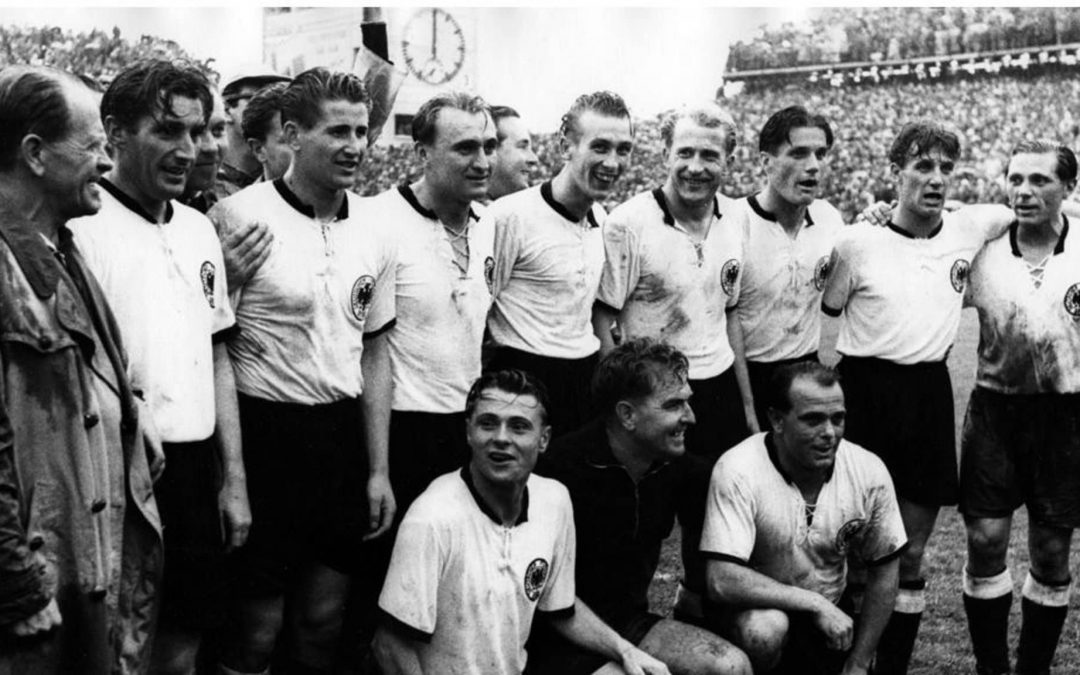The place was Switzerland, the stage was set & favorites were Ferenz Puskas’s Hungary. However the tournament sprung an unlikely winner with West Germany in the final. It was called as the Miracle of Bern. A nation that was divided, lost & in search of inspiration tasted glory. Let us have a look at their journey.
As Ferenc Puskas lined up for the 1954 World Cup final, the world’s greatest footballer at the time stood opposite a man trained as a banker who also ran a launderette. West Germany captain Fritz Walter and his team had overcome hefty odds just to be at the Wankdorf Stadium in Bern, Switzerland, and few gave them any chance against the Mighty Magyars of Hungary. The Germans were semi-professional at best, required by the German football authorities to hold down a ‘proper’ job alongside their club contract to kick around a ball. Opponents Hungary, meanwhile, were undefeated in four years, boasted some of the standout stars in world football and were a professional outfit. The stage was set for a mauling, but what occurred was perhaps the greatest upset the World Cup has ever seen. And one that simultaneously helped rebuild a nation’s identity.
Few observers gave the West German football team any real chance when they met the highly regarded Hungarian side, ‘the Mighty Magyars’, led by the great Ferenc Puskás in pouring rain in the World Cup final in Bern’s Wankdorf Stadium on July 4th, 1954. The Germans, contrary to received wisdom today, had little pedigree in international football up until this point. The Hungarians, on the other hand, were the ‘Golden Team’ of the postwar period, having outclassed England twice in the build up to the tournament in Switzerland. In the event, West Germany’s remarkable 3-2 victory (despite being 2-0 down after ten minutes) was indisputably the biggest sporting sensation since 1945. Not only that, but for the first time since the end of the war the Germans felt able to raise their heads above the parapet and display national pride in an achievement that was both a legitimate cause of celebration and appeared to have no connection with the recent Nazi past. In this context, the words of the West German radio commentator, Herbert Zimmermann, ‘It’s over! Over! Over! Germany are the World Champions’ – appear not just to refer to the outcome of the match but also to the promise of an end to the hardship and humiliation Germans had experienced since 1945, the so-called ‘Zero Hour’.
West Germany surprised many as they knocked off opponent after opponent. They beat Turkey twice (4-1 and 7-2) to make the quarterfinals before defeating Yugoslavia 2-0 in a defensive masterclass and trouncing Austria 6-1 in the semifinals. But their opponents in the final looked unbeatable. Boasting not just Puskas, but central playmaker Nandor Hidegkuti, frontman Sandor Kocsis, and winger Zoltan Czibor, Hungary were dazzling the world with their attractive, attacking brand of total football. Unbeaten in 30 matches before the final, they carried that high-scoring form into the tournament. In fact, Hungary had already embarrassed West Germany 8-3 in the group stages. Thanks to a bizarre format, Herberger had been able to rest eight of his players; safe in the knowledge the result wouldn’t affect their fate. Nevertheless, the gulf in quality was so large that no one gave the West Germans a chance, even with their first team.
The final match started on script, as Hungary found themselves 2-0 up after just eight minutes. Puskas tapped home the first when a deflected shot fell kindly to him, and Czibor nipped in to score the second after Werner Kohlmeyer‘s dreadful backpass to goalkeeper Toni Turek. Rather than stun the Germans, the setback spurred them into action, as forward Max Morlock famously screamed “Now let’s show them!”. In the 10th minute, Rahn whizzed in a low, speculative shot-cum-cross from the left and Morlock was on hand to slide the ball home. And after just 18 minutes, the scores were level at 2-2. Rahn ghosting in at the far post from a corner to half-volley the ball home with an outstretched foot. A Hungarian onslaught ensued, as Turek denied Hidegkuti twice, the Magyars hit the woodwork three times, and Kohlmeyer made up for his first-half error by clearing off the line.
Step forward, Rahn, one of the original bad boys of football whom Herberger had elevated to the first 11. On 84 minutes, he collected possession at the top of the box, feigned to shoot with his right before cutting back onto his left and nestling a low effort into the corner of the net. “Tor! Tor! Tor! Tor! Tor für Deutschland!” screamed commentator Herbert Zimmerman across West German airwaves. “Drei zu zwei führt Deutschland! Halten Sie mich für verrückt, halten Sie mich für übergeschnappt!” (“Germany lead 3-2! Call me mad, call me crazy!”). It’s a line that resonates in German football culture to this day. There was still time for a Puskas disallowed goal for offside and another outstanding Turek save from Kocsis in the dying minutes, but West Germany were world champions, against all the odds.
The victory no doubt set the precedent for West German teams to come, as they won two more World Cups and two European Championships before reunification in 1990. But it extended much further than that. Pride and patriotism was given a brief moment to flourish in a downtrodden and divided nation. And psychologically, many feel it instilled the belief necessary to rebuild a nation. The Miracle of Bern remains, for many, the country’s greatest sporting achievement, chiefly because it meant so much more than just a simple football game.
![]()

